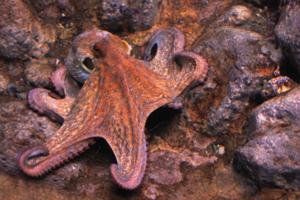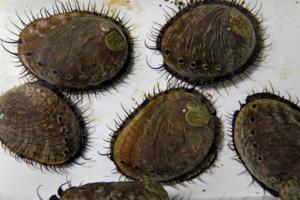Science & Technology
/Knowledge

Ancient lake from ice age comes back to life in Death Valley after record rainfall
Between 128,000 and 186,000 years ago, when ice covered the Sierra Nevada, a lake 100 miles long and 600 feet deep sat in eastern California in what is now the Mojave Desert.
As the climate warmed and the ice retreated, the lake dried up, leaving a white salt pan in its place.
But a November of record rainfall has brought the ancient lake, ...Read more

Some big water agencies in farming areas get water for free. Critics say that needs to end
LOS ANGELES — The water that flows down irrigation canals to some of the West’s biggest expanses of farmland comes courtesy of the federal government for a very low price — even, in some cases, for free.
In a new study, researchers analyzed wholesale prices charged by the federal government in California, Arizona and Nevada, and found ...Read more

Rare, deep-sea encounter: California scientists observe 'extraordinary' seven-arm octopus
Almost a half-mile below the surface of Monterey Bay, California, scientists recently recorded rare footage of a seven-arm octopus— only the fourth time the same research team has spotted the species in about four decades.
In a new video posted online, scientists with the Monterey Bay Aquarium Research Institute shared footage of the giant ...Read more

SpaceX sets $800 billion valuation, confirms 2026 IPO plans
SpaceX has authorized an insider share sale that values Elon Musk’s rocket and satellite maker at about $800 billion, according to a company message seen by Bloomberg on Friday.
The company also said it’s preparing for a possible public offering in 2026, a deal aimed at funding an “insane flight rate” for its developmental Starship ...Read more

Eroded Jersey Shore beaches could soon get federal money for replenishment. Will it be enough?
Congress appears poised to spend money in 2026 on beach replenishment projects in wake of the zero dollars it allocated this year.
But bills proposed in the House by U.S. Rep. Chuck Fleischmann, R-Tenn., and in the Senate by U.S. Sen. John Kennedy, R-La., appear to still fall woefully short of what’s needed, a coastal advocacy group says. U.S...Read more

As Florida offshore drilling looms, birds less protected from spills under Trump
TAMPA, Fla. — Richard Baker remembers the feathers: bright white and striking.
Just 20 days earlier, the Deepwater Horizon oil rig had exploded, killing 11 people and igniting one of the worst environmental disasters in modern history. A pelican and a Northern gannet were the first two birds plucked by wildlife rescuers from the oily waters ...Read more

Podcast industry under siege as AI bots flood airways with thousands of programs
Chatty bots are sharing their hot takes through hundreds of thousands of AI-generated podcasts. And the invasion has just begun.
Though their banter can be a bit banal, the AI podcasters' confidence and research are now arguably better than most people's.
"We've just begun to cross the threshold of voice AI being pretty much indistinguishable ...Read more

Colorado wolf re-released in Grand County after crossing into New Mexico
DENVER — Colorado Parks and Wildlife re-released a wolf into Grand County this week after it had traveled into New Mexico, according to a news release.
The New Mexico Department of Game and Fish captured gray wolf 2403 and returned the animal to Colorado.
Colorado wildlife officials decided to release the wolf in Grand County yesterday ...Read more

In search for autism's causes, look at genes, not vaccines, researchers say
Earlier this year, Health and Human Services Secretary Robert F. Kennedy Jr. pledged that the search for autism's cause — a question that has kept researchers busy for the better part of six decades — would be over in just five months.
"By September, we will know what has caused the autism epidemic, and we'll be able to eliminate those ...Read more

California Coastal Commission approves land deal to extend last nuclear plant through 2030
California environmental regulators on Thursday struck a landmark deal with Pacific Gas & Electric to extend the life of the state’s last remaining nuclear power plant in exchange for thousands of acres of new land conservation in San Luis Obispo County.
PG&E’s agreement with the California Coastal Commission is a key hurdle for the Diablo ...Read more

SpaceX launches 1st of 5 missions on tap in next 8 days on Florida's Space Coast
ORLANDO, Fla. — SpaceX and United Launch Alliance are combining for a busy week of rocket launches on the Space Coast.
First up Thursday evening was SpaceX’s planned Starlink 6-90 mission with 29 Starlink satellites from Cape Canaveral Space Force Station’s Space Launch Complex 40 at 5:01 p.m. Eastern time.
This was the 16th flight of ...Read more

California extends red abalone fishing ban for another 10 years
SACRAMENTO, Calif. — The California Fish and Game Commission voted Thursday to extend the closure of the recreational red abalone fishery for another decade, keeping the ban in place until April 2036.
The fishery has been closed since 2018, when the commission shut it down in response to a dramatic population decline along Northern California...Read more

Hopkins neurologist designed artificial intelligence to work like a human brain
BALTIMORE — Artificial intelligence systems designed to physically imitate natural brains can simulate human brain activity before being trained, according to new research from Johns Hopkins University.
“The work that we’re doing brings AI closer to human thinking,” said Mick Bonner, who teaches cognitive science at Hopkins. “What I ...Read more

Toxic water from Texas oil production is set to be treated and pumped into rivers
Texas is about to deploy a potential solution to the oil industry’s toxic wastewater problem — but it’s a move that carries environmental risks of its own.
State regulators are working to issue permits that would let four companies, including major landowner Texas Pacific Land Corp. and pipeline operator NGL Energy Partners LP, release ...Read more

Instacart is charging different prices to different customers in a dangerous AI experiment, report says
The grocery delivery service Instacart is using artificial intelligence to experiment with prices and charge some shoppers more than others for the same items, a new study found.
The study from nonprofits Groundwork Collaborative and Consumer Reports followed more than 400 shoppers in four cities and found that Instacart sometimes offered as ...Read more
'Nothing beautiful about that': Erase Trump's face from parks pass, lawsuit demands
Calling the design decision crass and disgusting as well as illegal, an environmentalist group is demanding that President Trump’s image be removed from the 2026 national parks pass.
A lawsuit filed Wednesday, Dec. 10, by the Center for Biological Diversity takes issue with an Interior Department switch-up that replaced the contest-winning ...Read more

SpaceX mission today 1st of 5 launches in 8 days on tap for Space Coast
ORLANDO, Fla. — SpaceX and United Launch Alliance are combining for a busy week or rocket launches on the Space Coast.
First up Thursday afternoon is SpaceX’s planned Starlink 6-90 mission with 29 Starlink satellites from Cape Canaveral Space Force Station’s Space Launch Complex 40. Liftoff is targeting 3:26 p.m. during launch window that...Read more

You can touch them, just don't eat them: Death cap mushrooms sicken Californians
LOS ANGELES — The winter season has brought cold and wet conditions that are perfect for fungi like death cap mushrooms, or Amanita phalloides, to grow in California, experts say, but with that has come a rash of people mistakenly eating them thinking they're safe.
So far this year, at least 23 people have been sickened by eating death cap ...Read more

Rooster 'epidemic' fueled by backyard coops, sanctuaries say
BALTIMORE -- A yearslong surge in displaced roosters is overwhelming animal sanctuaries in Maryland and across the country, fueled by a pandemic-born boom in backyard chicken coops and the noisy realities of owning a male bird.
“All the time — calls, emails, text messages wanting us to take roosters,” said Cathy Rogers, executive ...Read more

Amazon bets on color and AI with its priciest Kindle to date
Amazon.com Inc.’s new Kindle Scribe Colorsoft is the company’s most serious effort yet to turn its e-reader into a productivity tool. But with a starting price of $630 — making it the priciest Kindle yet — Amazon will need to persuade even its most loyal readers that the upgrade is worth it.
The device, which went on sale starting in ...Read more
Popular Stories
- Some big water agencies in farming areas get water for free. Critics say that needs to end
- Ancient lake from ice age comes back to life in Death Valley after record rainfall
- Rare, deep-sea encounter: California scientists observe 'extraordinary' seven-arm octopus
- California extends red abalone fishing ban for another 10 years
- SpaceX sets $800 billion valuation, confirms 2026 IPO plans





